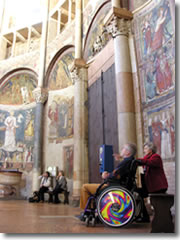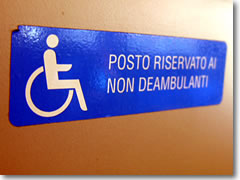- Places
- Plans
- Itineraries
- Experiences
 Even folks in a wheelchair are able to appreciate many of the amazing ancient sights of Italy, like this church in Ravenna.
Even folks in a wheelchair are able to appreciate many of the amazing ancient sights of Italy, like this church in Ravenna.
Though they've been making enormous strides in the past twenty years, Italy certainly won't win any medals for accessibility.
This really is not their fault. When the ancient Romans, medieval masons, and great Renaissance architects were designing their buildings, they weren’t exactly thinking of wheelchair ramps, sturdy handrails, or easy risers on those tight spiral stone staircases inside bell towers. But don’t let any disability stop you from traveling.
All the big cities have made an effort to accommodate people with disabilities over the past few years, at the very least putting in, wherever possible, ramps at museum and church entrances.
Even Venice, a seemingly impossible warren of narrow alleys interrupted every few blocks by one of hundreds upon hundreds of little footbridges that arch up steeply and over the myriad canals that divide the city up into 118 tiny islands, has made life easier for the mobility impaired. The city has installed wheelchair lifts on a key set of those little bridges that allow access to all the major sights and, indeed nearly half the entire city (the city’s tourism map shows which streets, and bridges, are accessible via this network—though locals report to me that the elevators don't always work, at least they're trying).
Hotels have also come a long way in the past decade. The vast majority of hotels rated three-stars and above now have at least a few handicap-friendly rooms easily accessible on the first floor.
 Sections on Italian trains, buses, and other public transport are set aside for wheelchairs.
Sections on Italian trains, buses, and other public transport are set aside for wheelchairs.
While ASL is understood by even fewer people over there than in the U.S., mutes might want to pick up a nifty set of laminated “phrase sheets” with tiny cartoons of everything related to travel—from chickens to banks to train stations—so you can just point to a pictogram to get your message across.
There is also no end of organizations dedicated to helping you plan and execute your trip, doling out specific advice before you go, and providing opportunities to travel. The most important are listed below.
It also might make sense to join a guided tour that caters to travelers with disabilities. These outfits (listed on a separate page) are very adept at taking care of the details, know all the hotels with handicap-accessible rooms, have vans and buses wheelchair-ready, and other specialized services for the physically challenged.
Accessible Italy (www.accessibleitaly.com) - A non-profit entity organizing tour and tourism services in Italy for the disabled since 1995. Tours, equipment rentals, a catalog of accessible accommodations, and all sorts of resources and tips.
Accessible Italian Holidays Service for the Disabled (www.accessibleitalianholiday.com) - Really, the name sums it up. Tours, rentals, and other services in popular Italian destinations.
Accessible Rome (www.slowtrav.com/italy/accessible/rome/index.htm) - A subsite within the Slow Travel Italy travel site with all sorts of intel, advice, and maps to help you see Rome in a wheelchair.
Associazione Nazionale Tutela Handicappati ed Invalidi, A.N.T.H.A.I., Corso Vittorio Emanuele 154, Rome (tel. +39-06-6821-9168, www.anthai.org) - The Italian National Association for Handicapped and Invalids provides general information and assistance to disabled travelers in Italy. Unfortunately, the site is in Italian only.
The Society for Accessible Travel & Hospitality (SATH), 347 Fifth Ave. Suite 605, New York, NY 10016 (212-447-7284, fax 212-725-8253, www.sath.org). SATH membership runs $49 a year ($29 for students and seniors 63 and older) and gets you access to a vast network of connections in the travel industry. They provide information sheets on travel destinations and referrals to tour operators that specialize in travelers with disabilities (I’ve got some leads for you there, too, listed on a separate page).
Mobility International, 132 E. Broadway, Suite 343 Eugene, Oregon USA 97401 (541-343-1284 Voice/TTY, fax 541-343-6812, www.miusa.org). This worldwide organization promotes international disability rights, hosts international exchanges, and provides reference sheets on travel destinations for people with disabilities. Its books and videos have resources on everything from biking trips to exchange programs. It also has plenty of free, downloadable info on its site.
Gimp on the Go (www.gimponthego.com) - Can't say I am terribly comfortable with the name, but can't deny that the site is chock full of tips and resources for handicapped travelers.
Travelin' Talk Directory, P.O. Box 3534, Clarksville, TN 37043 (931-552-6670; fax 931-552-1182, www.travelintalk.net). Their "Emerging Horizons" newsletter comes free when you join ($19.95 for lifetime membership).
Moss Rehab Hospital, 60 East Township Line Rd., Elkins Park, PA 19027 (215-456-9600 or 215-456-9602 TTY, www.mossresourcenet.org). This Philadelphia-based organization (actually, they're now in suburban Elkins Park, which is weird because that's next to the town where I grew up) has been providing advice and referrals to travelers with disabilities for years.
American Foundation for the Blind, 11 Penn Plaza, Suite 300, New York, NY 10001 (800-232-5463 or 212-502-7600, www.afb.org). They can fill you in on travel for the sight-impaired in general, as well as give you advice on how to get your seeing-eye dog past the normal quarantines into Italy with you.
American Academy of Otolaryngology, 1650 Diagonal Road, Alexandria, VA 22314 (703-836-4444 or 703-519-1585 TTY, www.entnet.org). Travelers with a hearing impairment should contact these folks.
Share this page
Search ReidsItaly.com